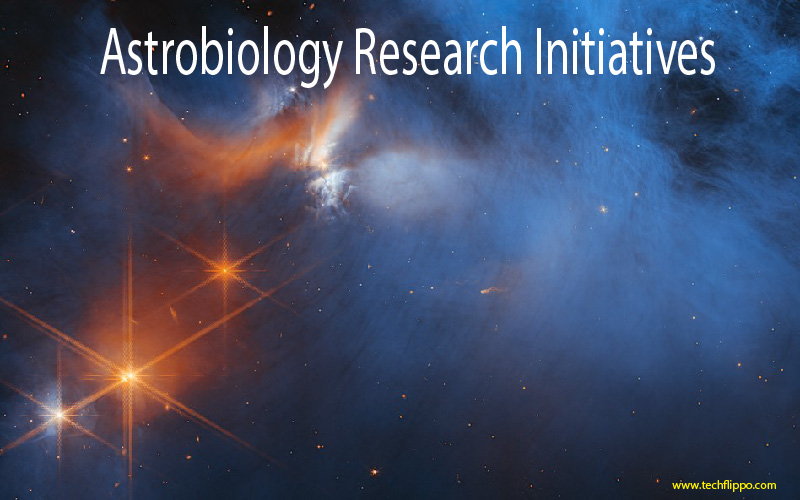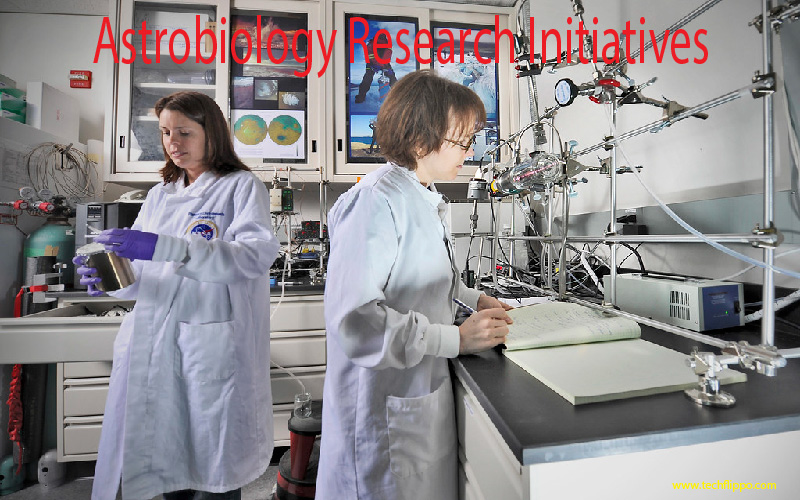A Closer Look at Astrobiology Research Initiatives
Embark on a journey through the cosmos as we delve into the fascinating realm of astrobiology research initiatives. From unraveling the mysteries of extraterrestrial life to exploring the origins of life on Earth, this dynamic field offers a glimpse into the possibilities beyond our planet. Join us in uncovering the cutting-edge advancements, interdisciplinary collaborations, and ethical considerations that shape the frontier of astrobiology. Get ready to be captivated by the endless possibilities and challenges that lie ahead in this exhilarating scientific pursuit!

Current Research Initiatives in the Field
Astrobiology is a field buzzing with exciting research initiatives aimed at unraveling the mysteries of life beyond Earth. Scientists worldwide are actively engaged in pushing boundaries to explore the potential for extraterrestrial life forms. From studying extremophiles in harsh environments on our planet to analyzing meteorites for organic compounds, researchers are leaving no stone unturned.
One significant focus is understanding how life originated on Earth and whether similar processes could have occurred elsewhere in the universe. By investigating ancient rocks, probing deep-sea hydrothermal vents, and simulating early planetary conditions in labs, astrobiologists strive to piece together the puzzle of life’s beginnings.
Interdisciplinary collaborations play a crucial role in advancing astrobiology research. Biologists team up with geologists, chemists work alongside physicists – all pooling their expertise to tackle complex questions about the potential habitability of exoplanets and moons.
Cutting-edge technologies such as next-generation sequencing, spectroscopy, and robotic missions enable scientists to gather data from remote locations within our solar system and beyond. These tools provide valuable insights into potentially habitable environments and aid in the search for biosignatures indicative of alien life forms.
As researchers forge ahead with these diverse projects, ethical considerations loom large. Discussions surrounding contamination prevention during space exploration activities or protocols for handling potential evidence of extraterrestrial life remain critical aspects that demand thoughtful reflection.
The realm of astrobiology brims with endless possibilities yet also presents formidable challenges: from navigating funding constraints to overcoming technical hurdles associated with interstellar travel. Despite these obstacles, the quest for answers about our place in the cosmos continues unabated – driving curiosity-driven investigations that promise groundbreaking discoveries on an unprecedented scale.
The Search for Extraterrestrial Life
The search for extraterrestrial life captivates the imagination of scientists and space enthusiasts alike. With advancements in technology, researchers are exploring distant planets and moons for signs of habitability.
Missions like NASA’s Mars Rover and upcoming missions to Europa, one of Jupiter’s moons, offer hope for discovering microbial life beyond Earth. The presence of water or organic molecules on these celestial bodies sparks curiosity about the possibility of alien life forms.
Astrobiologists analyze extreme environments on Earth to understand where life could potentially thrive in other parts of the universe. By studying extremophiles in harsh conditions such as deep-sea hydrothermal vents or acidic hot springs, scientists gain insights into the resilience and adaptability of living organisms.
As we continue to push the boundaries of our cosmic exploration, the quest for extraterrestrial life remains a tantalizing endeavor that holds promise for groundbreaking discoveries in the future.
Understanding the Origins of Life on Earth
Have you ever wondered how life on Earth began? The study of astrobiology delves into the origins of life, seeking to unravel this age-old mystery. Scientists explore various hypotheses, from panspermia – the idea that life arrived here from outer space – to abiogenesis, the theory that life arose spontaneously on our planet.
Through interdisciplinary research efforts combining biology, chemistry, geology, and physics, researchers aim to piece together the puzzle of how simple molecules evolved into complex organisms. By studying extremophiles in harsh environments like hot springs or deep sea vents, scientists gain insights into how early life forms may have thrived in extreme conditions.
The discovery of organic compounds in meteorites and the analysis of ancient rocks provide clues about the chemical processes that could have kickstarted life’s emergence. Understanding Earth’s primordial environment sheds light on the conditions necessary for life to take root and flourish billions of years ago.
Interdisciplinary Approaches in Astrobiology
Astrobiology is a field that thrives on collaboration and the melding of diverse disciplines. Interdisciplinary approaches in astrobiology bring together experts from various fields like biology, chemistry, geology, physics, and even engineering to tackle complex questions about life beyond Earth.
Biologists contribute their knowledge of how life functions and evolves, while chemists study the chemical processes necessary for life to arise. Geologists help us understand planetary environments where life could exist, and physicists explore the boundaries of what we know about the universe. Engineers develop cutting-edge technologies to support astrobiological research initiatives.
By integrating these different perspectives and skill sets, interdisciplinary teams can push the boundaries of our understanding of astrobiology further than any single discipline could achieve alone. The synergy created by bringing together these varied expertise leads to innovative solutions and breakthrough discoveries in the quest to unravel the mysteries of life in the cosmos.

Technological Advancements in Astrobiology Research
Technology plays a crucial role in advancing astrobiology research initiatives, pushing the boundaries of exploration beyond what was once thought possible. From sophisticated instruments to cutting-edge spacecraft, technological advancements have enabled scientists to delve deeper into the mysteries of the cosmos.
One significant breakthrough is the development of state-of-the-art telescopes capable of detecting exoplanets in distant star systems. These powerful tools not only identify potential habitable worlds but also analyze their atmospheres for signs of life. Furthermore, advanced laboratory techniques allow researchers to simulate extraterrestrial environments and study extremophiles – organisms that thrive in extreme conditions.
Moreover, robotic missions to celestial bodies like Mars and Europa provide valuable data on the potential for past or present microbial life. Miniaturized instruments onboard these spacecraft can conduct on-site analysis and transmit findings back to Earth in real-time. As technology continues to evolve, so does our ability to explore new frontiers and unlock the secrets of life beyond our planet.
Ethical Considerations in Astrobiology Research
Ethical considerations play a crucial role in astrobiology research initiatives. As scientists delve into the mysteries of life beyond Earth, questions arise about how to responsibly explore and potentially interact with other forms of life.
One major ethical concern is ensuring that our search for extraterrestrial life does not harm or disrupt existing ecosystems on other planets or moons. The introduction of Earth organisms to these environments could have unintended consequences.
Additionally, there are ethical dilemmas surrounding the potential discovery of intelligent alien civilizations. How would we communicate with them? What rights should they be afforded?
Astrobiologists must also grapple with issues related to planetary protection protocols, ensuring that spacecraft do not contaminate pristine environments with terrestrial microbes.
Navigating these complex ethical waters requires thoughtful consideration and international collaboration to establish guidelines that balance scientific exploration with respect for any potential extraterrestrial life forms encountered along the way.
Future Possibilities and Challenges for Astrobiology
As we look towards the future of astrobiology research initiatives, the possibilities seem boundless. With advancements in technology and our growing understanding of life on Earth, the search for extraterrestrial life becomes increasingly promising.
One of the challenges that researchers face is the vastness of space and the limitations of current exploration methods. Developing innovative technologies to overcome these barriers will be crucial in expanding our reach into the cosmos.
Additionally, ethical considerations surrounding potential discoveries must be carefully navigated. How we approach contact with alien life, if found, raises complex questions about our impact on other worlds.
Despite these challenges, the field of astrobiology continues to inspire curiosity and drive scientific progress. The mysteries waiting to be unraveled beyond our planet offer a frontier ripe for exploration and discovery.
Conclusion: The Exciting Frontier of Astrobiology
Astrobiology Research Initiatives offer a fascinating journey into the unknown, where scientists explore the mysteries of life beyond our planet. The interdisciplinary nature of this field allows for innovative collaborations and breakthrough discoveries that continue to push boundaries. As technology advances, our ability to study astrobiology in more depth increases, opening up new possibilities for finding answers to age-old questions.
The search for extraterrestrial life remains one of the most intriguing aspects of astrobiology research, with missions like Mars rovers and upcoming space telescopes aiming to uncover clues about potential life elsewhere in the universe. Understanding the origins of life on Earth provides valuable insights into how life may have evolved on other planets or moons.
Ethical considerations play a crucial role in guiding astrobiology research, ensuring that exploration is done responsibly and with respect for any potential forms of alien life that may be encountered. Looking ahead, future challenges will undoubtedly arise as we strive to overcome obstacles such as technological limitations and budget constraints.
Astrobiology Research Initiatives stand at the forefront of scientific discovery, offering endless opportunities for exploration and unlocking profound insights into the fundamental questions of our existence. The quest to understand if we are alone in the universe continues to inspire researchers worldwide as they embark on this exciting frontier of astrobiology.